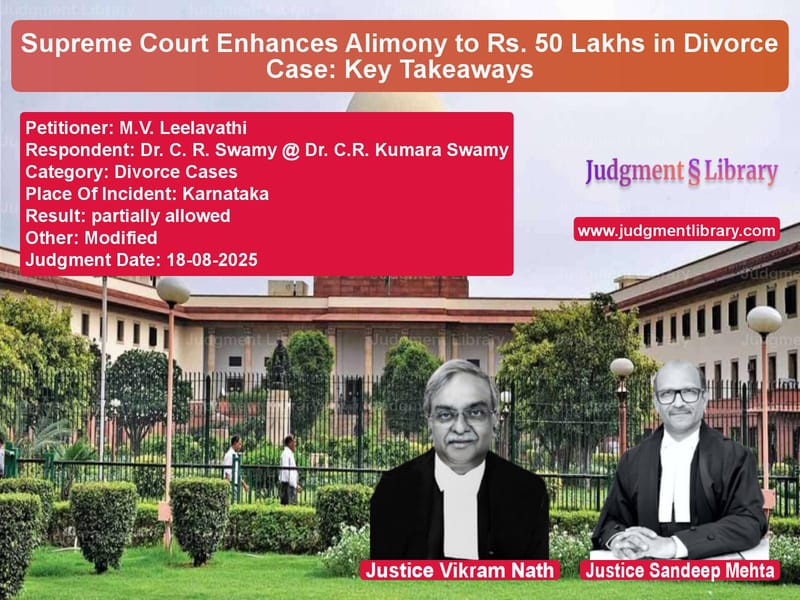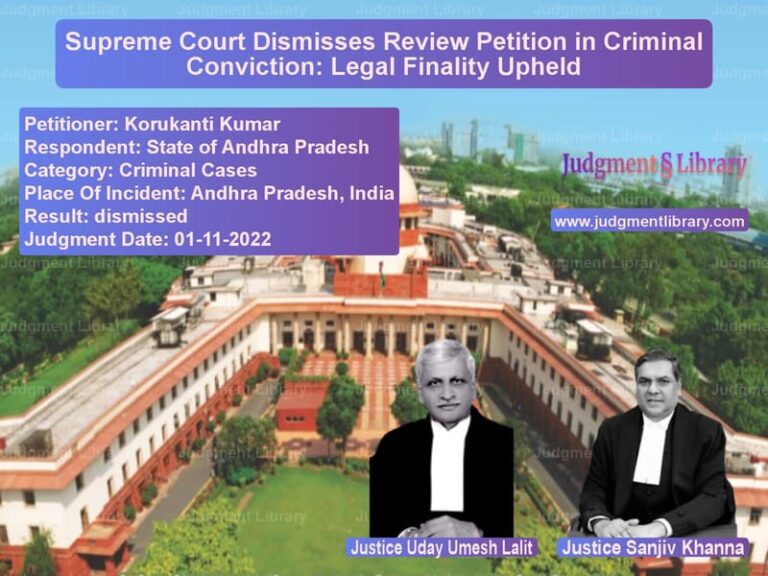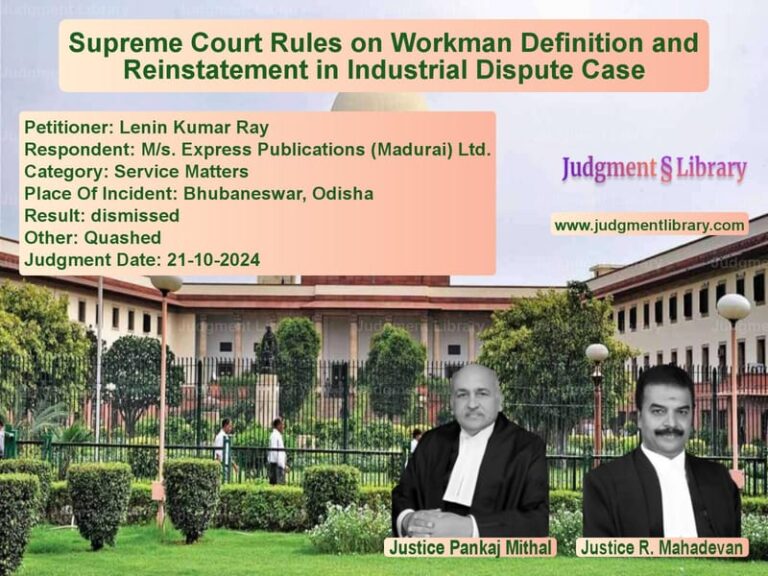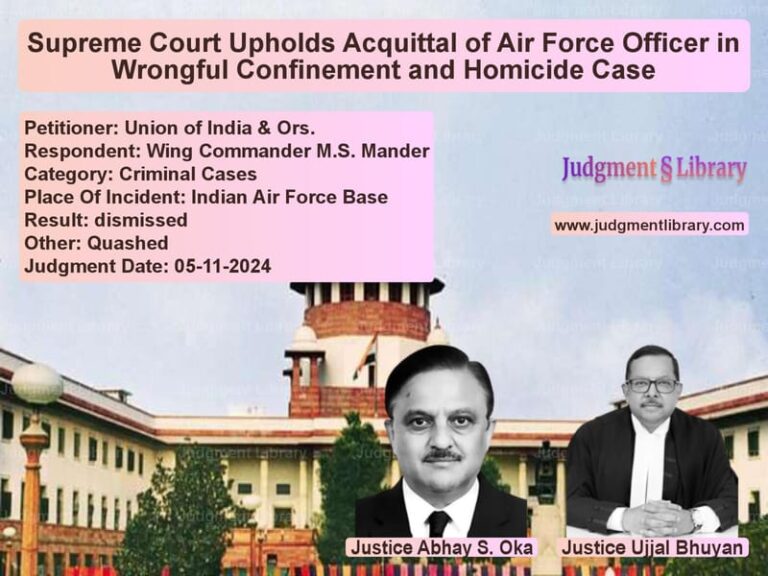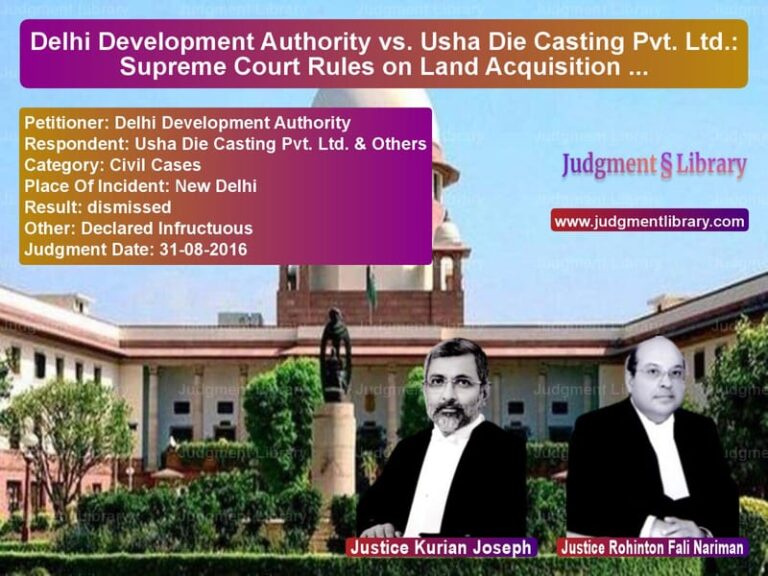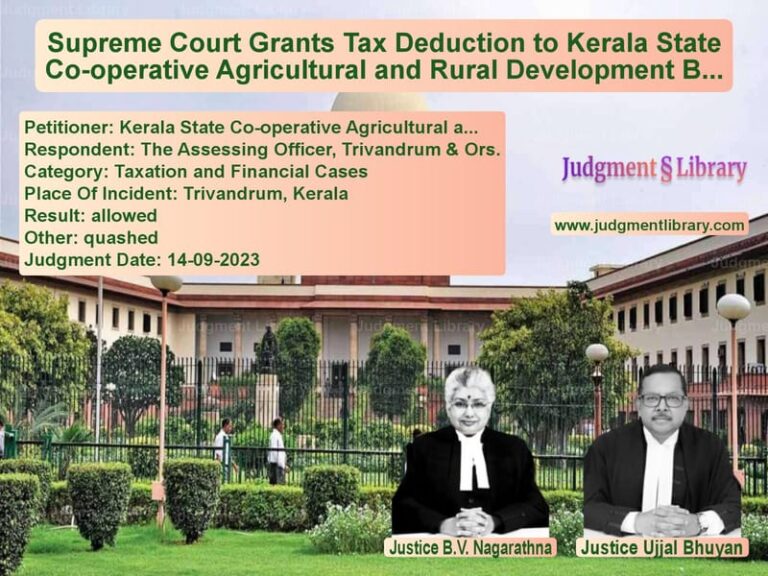Supreme Court Enhances Alimony to Rs. 50 Lakhs in Divorce Case: Key Takeaways
The Supreme Court of India recently delivered a significant judgment in a divorce case that underscores the delicate balance between a spouse’s capacity to pay and the other’s need for financial security. The case involved M.V. Leelavathi, the appellant-wife, and Dr. C.R. Swamy, the respondent-husband. The core of the dispute revolved around the dissolution of their marriage and the subsequent award of permanent alimony. While the lower courts had granted a divorce and awarded alimony, the wife approached the Supreme Court, feeling the amount was insufficient. The Supreme Court’s decision to substantially enhance the alimony offers a profound insight into how courts assess financial settlements in matrimonial disputes.
The journey of this case began in the Family Court, where the husband had initially sought divorce on the grounds of mental cruelty. The wife, on the other hand, had contested the divorce and even filed a counterclaim seeking restitution of conjugal rights, indicating her desire to save the marriage. The Family Court, however, granted the divorce and awarded the wife a sum of Rs. 15,00,000 as permanent alimony. Unsatisfied, both parties approached the High Court. The wife challenged the divorce decree itself, while the husband contested the alimony amount. The High Court upheld the Family Court’s decision on both counts, leading the wife to file the present appeals before the Supreme Court.
The Supreme Court, however, limited its scrutiny to the question of alimony. The central issue before the Court was whether the amount of Rs. 15 lakhs was just and equitable, considering the husband’s income and the wife’s circumstances. To make an informed decision, the Court directed both parties to file affidavits disclosing their income and liabilities. This step was crucial in moving beyond mere assertions and basing the judgment on concrete financial data.
The respondent is a doctor earning approximately Rs.1,40,000/- per month from his employment. The appellant holds an M.Tech (Computer Science) and an LL.B. degree. She claims to be presently unemployed.
The respondent has produced his Income Tax Returns reflecting a taxable income of around Rs.1.4 lakhs per month, along with his bank statements. The appellant asserts that in the year 2010, the respondent purchased property in his own name.
The Court’s analysis of these facts forms the bedrock of its judgment. It acknowledged the husband’s financial capacity, noting that his documented income demonstrated an ability to pay more than what had been awarded by the lower courts. At the same time, the Court did not overlook the wife’s qualifications. Despite being currently unemployed, her advanced degrees in computer science and law indicated a clear potential for her to be self-sufficient in the future. The Court had to navigate between ensuring she was not left in a state of economic deprivation and acknowledging her own capability to earn.
Determination of alimony requires consideration of multiple factors. It is evident from the material on record that the respondent has the capacity to pay a higher amount than that awarded by the Family Court. At the same time, although the appellant claims to be unemployed, she is highly qualified and has the ability to earn and sustain herself. She is not in a state of acute economic deprivation. A balanced approach, weighing the respondent’s capacity and the appellant’s needs, must therefore be adopted.
This reasoning highlights a modern and pragmatic approach to alimony. The Court moved away from the traditional notion of perpetual dependency and instead focused on providing a one-time settlement that would act as a bridge, securing the wife’s future while implicitly expecting her to eventually utilize her qualifications for financial independence. The Court found the original amount of Rs. 15 lakhs to be inadequate for this purpose and decided to enhance it significantly.
Having considered the submissions and the evidence on record, we find it just and equitable to enhance the permanent alimony to Rs.50,00,000/- as a one-time settlement. This amount will reasonably secure the appellant’s future and ensure a standard of living commensurate with her circumstances.
The enhancement from Rs. 15 lakhs to Rs. 50 lakhs is a substantial one, reflecting the Court’s assessment of what constitutes a fair and secure settlement. To make the payment manageable for the husband, the Court ordered it to be paid in five equal monthly instalments of Rs. 10,00,000 each, with the final payment due by January 31, 2026. The Court also directed the wife to provide her bank details to facilitate the transfer of funds. Most importantly, the Court made it clear that this one-time payment would bring a final close to all claims arising from the marriage and the long-drawn litigation, providing closure to both parties.
In view of the above, the appeals are partly allowed. While affirming the decree of divorce, we modify the High Court’s order to the extent that the permanent alimony payable to the appellant-wife shall be Rs.50,00,000/- as a one-time settlement. All claims arising from the marriage and the present litigation shall stand fully and finally settled.
This judgment is a landmark in its nuanced handling of alimony. It carefully balances the rights and responsibilities of both spouses. It recognizes the husband’s superior financial capacity without imposing an endless burden, and it secures the wife’s future without fostering permanent dependency. By considering the wife’s high qualifications, the judgment also sends a message that alimony is not merely about sustenance but about providing a foundation for a dignified life post-divorce, acknowledging the potential of both parties to move forward. The ruling emphasizes that fairness and equity, tailored to the specific facts of each case, are the ultimate guiding principles in awarding permanent alimony.
Petitioner Name: M.V. Leelavathi.Respondent Name: Dr. C. R. Swamy @ Dr. C.R. Kumara Swamy.Judgment By: Justice Vikram Nath, Justice Sandeep Mehta.Place Of Incident: Karnataka.Judgment Date: 18-08-2025.Result: partially allowed.
Don’t miss out on the full details! Download the complete judgment in PDF format below and gain valuable insights instantly!
Download Judgment: m.v.-leelavathi-vs-dr.-c.-r.-swamy-@-dr-supreme-court-of-india-judgment-dated-18-08-2025.pdf
Directly Download Judgment: Directly download this Judgment
See all petitions in Alimony and Maintenance
See all petitions in Property Division in Divorce Cases
See all petitions in Judgment by Vikram Nath
See all petitions in Judgment by Sandeep Mehta
See all petitions in partially allowed
See all petitions in Modified
See all petitions in supreme court of India judgments August 2025
See all petitions in 2025 judgments
See all posts in Divorce Cases Category
See all allowed petitions in Divorce Cases Category
See all Dismissed petitions in Divorce Cases Category
See all partially allowed petitions in Divorce Cases Category

